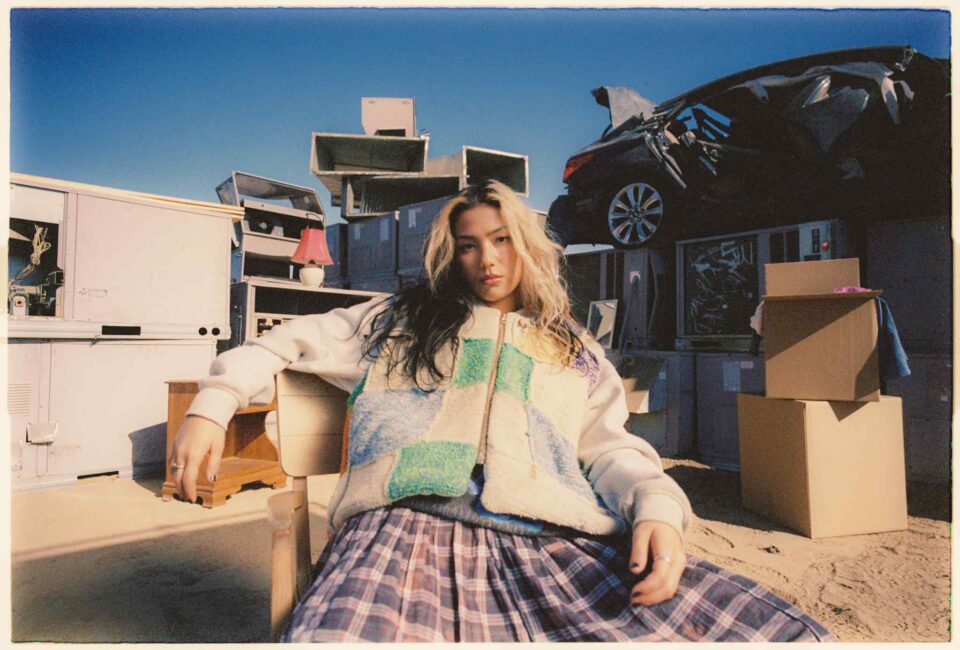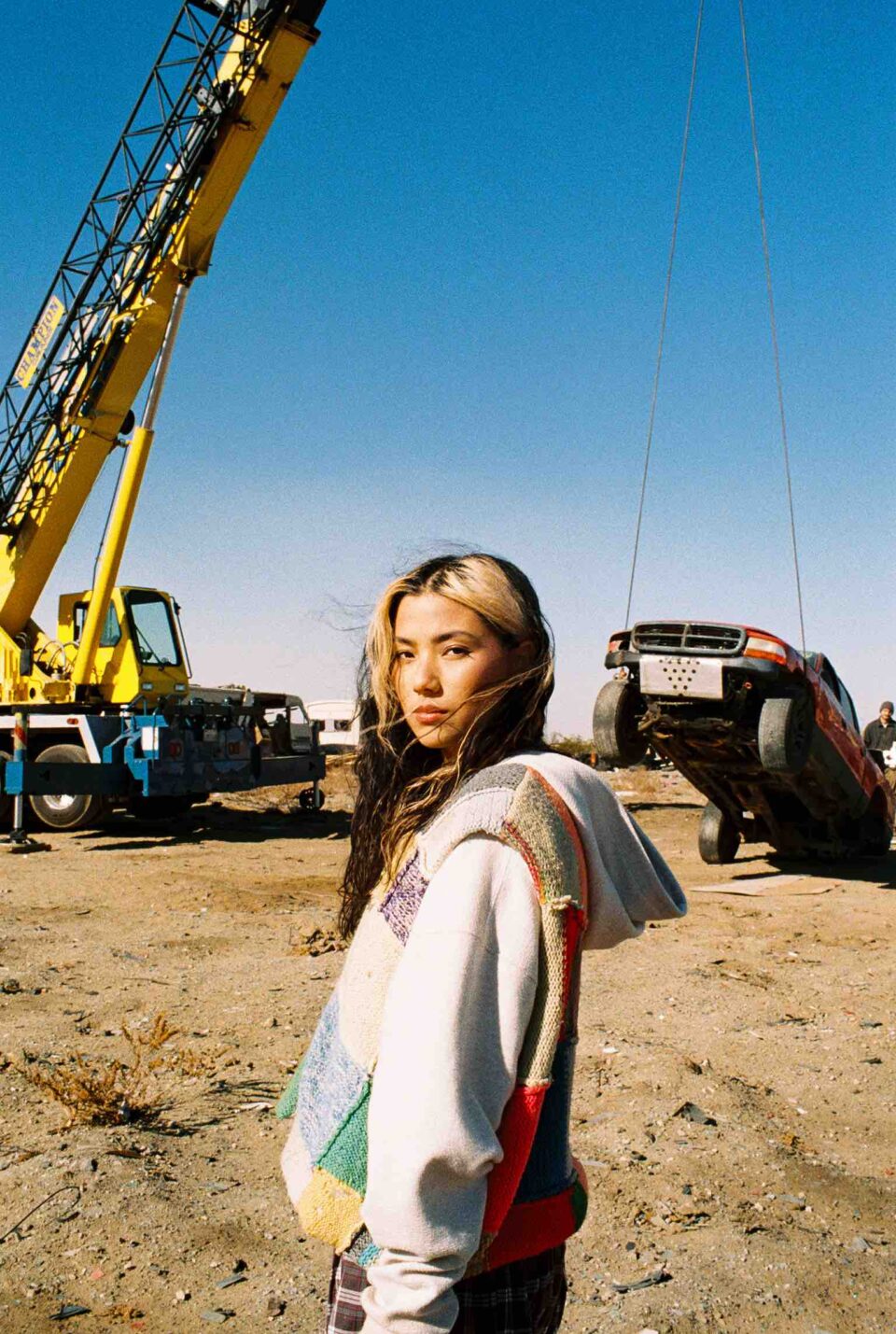Claire Chicha, the musician who makes vibrant and textural pop music as spill tab, is telling me about the remarkable life span of king salmon. “They die where they’re born,” she says, the fascination heavy in her voice. Visiting from LA, Chicha sits across from me at a Colombian coffee shop in Brooklyn, wearing an aqua-blue sweatshirt and a silver chain necklace with a bat that hangs in the middle.
King salmon are born in freshwater and, after a few developmental stages, migrate to the ocean. They can spend several years as adults in salt water before they swim upstream, back to the exact fresh water river where they were born, to mate and die soon after. Their migration is instinctual and steady. “In my mind, they just fucking shoot upstream,” she says, offering a contagious chuckle. “They don’t have Google Maps, you know? I mean, my ass would not get anywhere without Google Maps.” In awe of nature’s incredible homecoming, she adds: “It’s crazy, and it’s very poetic.”
We’re talking about salmon because Chicha is discussing her debut album, Angie. This adaptive fish seems like a mascot for the project—a token of survival and evolution—and it makes an appearance across the album’s visual campaign, from tour posters to the focal point of the album’s cover. Elsewhere, water (or lack thereof) is significant across these 12 tracks: diving into the sea is an act of ultimate devotion; morning dew carries the weight of romantic history; cracks in wet bathroom floors are a place to disappear within. When I wonder aloud about the significance of all this, she reveals she’s a cancer. “A big water sign,” she says with a laugh. “I love the tactility of water. There’s such an immediate, physical depiction of it. I like to write visually.”
spill tab released her first song in 2019, but our conversation makes clear that Angie is the result of a long, hard journey through her creative life—the complicated lessons learned from our productivity-obsessed world, where more hours put in means a stronger result. To a degree, that can be true, but there isn’t an easy formula for what works. “It took me probably two to three years to realize that you can work so hard on something for so long, and it will not necessarily make it a better song,” she says. She notes that one of her most successful singles, “Cotton Candy,” took 20 minutes to write, whereas others have taken years to nail down. “I used to overcook everything. I was just taking away the life and the human error, which makes it cool and different. A lot of the songs on this album are me being like, ‘Let me not keep working on this.’ Get it to a place where I accept it and not go too far.”
Every song on Angie struts differently as bright, melodic contours confidently flow through several genres within a single song. On “Adore Me,” her satiny vocals buoy a sweeping piano ballad where trumpets come to her forlorn aid. It’s lush and fluid, especially compared to the preceding “Pink Lemonade,” which is playful and wobbly like a toddler taking its first steps. “The little baby voice in that is the idea of drying out, like Spongebob out of the water,” she says. “It’s small and dehydrated.” That tension between curdled experimentation and velvety cinematics is the album’s alluring magnetic field. “The intention with the visuals is very arid and dusty and deserty—a lot of textures are very void of water. Which is interesting, because the music is more flowy in certain places. I like the contrast. There’s something about feeling completely dehydrated that goes with the essence of the album, a little depleted.”

“I used to overcook everything. I was just taking away the life and the human error, which makes it cool and different.”


That artful use of contrast also comes through in her lyricism as Chicha switches between English and French. “I think that song would’ve been really frightening to people who speak English if I’d written it in English,” she laughs, speaking about “De Guerre,” the album’s darkest and initially most hostile-sounding track. Born to a French-Algerian composer father and a Korean pianist mother, she spent her childhood living in LA, Thailand, and Paris. “French culture is so much more brash and honest,” she tells me before invoking one of her favorite movies: La Haine, Mathieu Kassovitz’s 1995 film exploring the racial and class hostilities in France’s banlieue districts. “It’s a really violent, visceral movie, but it’s one of my favorite movies. Even though it’s in black and white, you get so much texture. I think actually black and white, in some ways, makes you focus on texture more,” she says, relating to the importance of certain creative frameworks. “[‘De Guerre’], to me, was best explained in French because it was supposed to feel quite violent, and it’s being in a warehouse or a nightclub situation and going fucking hard.”
She adds that a number of more mainstream psych-thrillers from the 1990s also influenced her. “Someone mashed up Trainspotting and Fight Club snippets to ‘Where Is My Mind’ on YouTube, but the overlap in aesthetic is crazy. You’d think it was the same movie they were pulling from. We basically played that underneath ‘De Guerre’ when we were finishing up production to inspire textures and stuff.” She adds, “It lines up perfectly because there’s a moment in that video where Ewan McGregor slips through the carpet and sinks, and that’s when the high really hits—that’s when the outro of the song happens, and it’s a release, more hyper-poppy.”
This is the second instance in our conversation where she mentions visuals of slipping through that impacted Angie. Her music video for “Pink Lemonade” drew inspiration from the couch-sinking scene in the 2021 miniseries Maid, illustrating another integral tension to Angie that’s most explicit in certain tracks calling out for attention: “Adore Me,” “Hold Me,” “Want Me.” Album closer “Wet Veneer” is soft as seafoam, but leaves us with a wistful ending: “Say you don’t need me / I’ll disappear / Do you agree with that?” she sings gently before a trumpet graciously carries us to the end. “A lot of the notions of wanting to disappear are from grief, and then the notions of wanting to be seen come from being alive and wanting to be understood,” she explains. “It’s weird to end it on a really sad song, but I felt that was a bit of the truth of it all—nothing is necessarily resolved.”

“I like the idea that the first album would be a girl’s name—it’s like my first daughter. Which I thought was really cute and endearing.”
King salmon undergo a transformation as they migrate home. Their scales change color, their jaws change shape, and their teeth get sharper as they ready themselves for new life. Angie is not only dynamic because of spill tab’s malleable sonic palette, but also because it explores the ever-evolving selfhood we endure throughout our lifetime. When we discuss the thought process behind the album title, it feels touchingly metaphorical, part self-acceptance and part self-preservation. “I like the idea that the first album would be a girl’s name—it’s like my first daughter,” she laughs. “Which I thought was really cute and endearing. In the moment of writing [the title track], that’s the name of the era that I went through that I just hated my life.” Chicha never explains why she chose that specific name, but clarifies it was never a nickname or an old moniker. “In my mind, when I wrote it, I was writing about myself at that time. The name Angie was the one I ended up using. I was writing to myself through a different name.”
Angie isn’t a concept album, and it isn’t an album with a linear narrative. Each song shrinks and expands, entering new phases of love or grief in an evolving form. “I think if you’re attempting to be accessible to everyone, you’re sort of failing,” she admits. “I think I process loss very similarly every time. So the hope is that it’s cohesive in the sense that I’m still the same person, experiencing different things, but processing in the same way. I feel like sometimes [with] concept albums there’s a journey, but this is more the reality that I’m still dealing with all the same things that I was five years ago—I’m just evolving in my understanding of it, but it’s not really resolved ever. The hope was to say, like, ‘All these things can happen, and I know myself better, but it doesn’t necessarily mean that I’ve capped anything.’”
With Angie, spill tab embarks on her own salmon run—evolving, mourning the past, and returning to herself to birth something new. FL

photo by Jade Sadler







